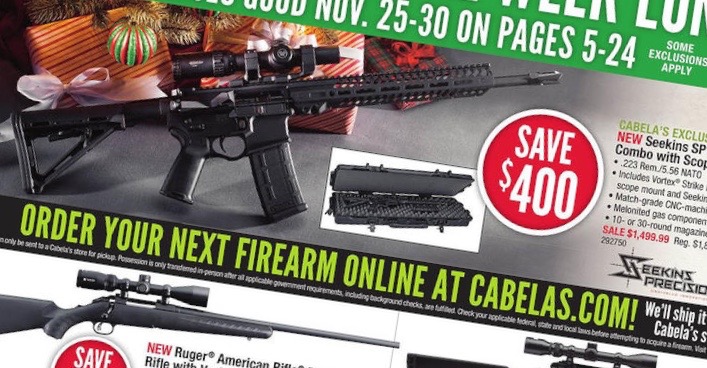Hillary Clinton lost her bid for the White House, and the National Rifle Association’s 2016 champion Donald Trump is almost certain to leave firearm regulations alone. But America’s appetite for guns is more voracious than ever.
The Federal Bureau of Investigation’s National Instant Criminal Background Check System processed more background checks for gun transactions on Black Friday — 185,713 in total — than on any single day since the system launched nearly two decades ago, an agency spokesperson tells The Trace. November 25’s total just barely broke the record set on last year’s Black Friday, when the FBI processed 185,345 checks.
There is no single database of gun purchases, so NICS is considered the best available proxy of sales.
Retail sales traditionally spike the Friday after Thanksgiving as shoppers rush to begin the holiday gift-giving season, often drawn in by special discounts. Gun sales have been lifted by the same tide in the past — four of the top ten busiest days for NICS were Black Fridays, including the most recent Black Friday (four more of the top ten highest-volume days came in the week immediately following the 2012 Sandy Hook shooting).
But the new record-breaking day for background checks defied expectations. Last week, a spokesman for the FBI told The Trace that the bureau projected the number of checks on November 25 would fall to 180,500, a decrease of more than 5,000 over last year.
Gun industry sources predicted a similar sales slump after Donald Trump’s surprise election victory. For more than a year before the election, gun sales were buoyed by several mass shootings and the threat of a Hillary Clinton presidency. Gun buyers had plenty of reason to expect new regulations would soon make it harder to buy exactly the weapons they wanted. For 18 consecutive months, the NICS system charted monthly records for total checks.
Bryan Bryner, owner of the Phoenix Tactical gun shop in Newark, Ohio, told USA Today that had Clinton won, he “would have been out of everything” by Black Friday.
When Donald Trump triumphed, aided by more than $30 million in campaign spending by the NRA, the perceived threat to gun rights posed by Clinton evaporated. Without that threat, industry analysts expected the wave of panic buying to finally break. Since November 8, shares of the country’s two publicly traded gun companies — Smith & Wesson and Sturm, Ruger, & Co. — fell by by 16 percent and 18 percent, respectively.
“Naturally with the Trump victory, such consumer fears would subside, so there will likely be no near-term demand surge any time soon for firearms,” financial analyst Rommel Dionisio of Wunderlich Securities told The Street.
The latest FBI statistics suggest that sales volume hasn’t collapsed at all. Sales are continuing apace, even when guns like the AR-15s often used in mass shootings and targeted by proposed assault weapon bans will be freely available for the foreseeable future. They’re surging even though there hasn’t been a high-profile rampage shooting or terror attack in months.
There are reports that unconventional buyers have buoyed gun sales after Trump’s victory. NBC News found some gun store owners saw a surge in African American customers after the election, fearing for their own protection out of a belief Trump’s victory will embolden racists to attack minorities.
But there may be a more prosaic reason for the surging background checks: Gun stores were trying to move excess inventory they had stocked in anticipation of a Clinton win. Rick Friedman, co-owner of RTSP, a gun shop and range in Randolph, New Jersey, told reporters his store had accumulated eight to 12 months’ worth of stock. On Black Friday, his store offered steep discounts on guns, ammunition, and accessories.
“We were gearing up for a much different result,” he said.
[Photo: Cabella’s Black Friday catalog]
Correction: an earlier version of the piece erroneously stated that the Phoenix Tactical gun shop was located in Arizona. It is actually located in Ohio.

